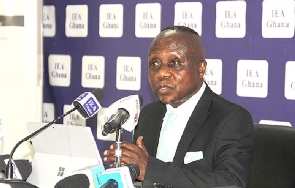 Dr. John Kwabena Kwakye, Senior Economist and Director of Research at IEA
Dr. John Kwabena Kwakye, Senior Economist and Director of Research at IEA
The Institute of Economic Affairs (IEA) has described as worrisome the expectation that Other Financing Sources – international concessional and development partners – are expected to finance the entire projected budget deficit in the medium-term; that is, between 2023 and 2026.
Data available in the budget statement suggest that the deficit is projected at GH¢61.5billion in 2023, or 7.7 percent of the Gross Domestic Product (GDP). It is expected to be GH¢71billion, GH¢54.4billion and GH¢61billion in 2024, 2025 and 2026 respectively – which is to be funded by overseas parties as the Bank of Ghana (BoG) scales back on its monetisation of the deficit.
Already, the central bank has financed the 2022 budget with an injection of GH¢49.9billion – a development analysts are concerned will keep inflation up. The BoG has had to make the interventions mostly because deposit money banks (DMBs) have demanded a premium to purchase government securities due to deteriorating market conditions.
This has seen interest rates trend upward across the spectrum of the yield curve, with the base 91-day Treasury bill accelerating from 12.49 percent at the beginning of the year to 31.53 percent in October – with the 182-day Treasury bill following suit, rising from 13.91 percent to 32.61 percent over the same period and similar developments on the 364-day instrument, 2-year, 3-year and 5- and 6-year bonds.
Welcoming the expected lower level of participation by the BoG in financing the budget shortfall, the IEA however noted that solely dependinge on foreign parties could have dire consequences for domestic development projects.
“The entire financing for the period is to be provided by multinational and other international partners. This is worrisome, because if for some reason they do not fully materialise – such as due to government’s inability to meet some conditions – government may have to fall back on the BoG and/or forgo some development projects and programmes,” stated IEA’s Director of Research, Dr. John Kwakye.
CAPEX
The situation has assumed increased importance over the historically low percentage share of capital expenditure (CAPEX) to GDP, especially when compared to recurrent expenditure.
The 2023 budget projects a CAPEX of GH¢27.7billion (3.5 percent of GDP) compared to big-ticket, recurrent items such as compensation (GH¢45billion) and interest payment (GH¢52.6billion).
With the desperate need for hard and soft infrastructure – roads, bridges, hospitals, schools, factories, housing facilities, energy systems, water systems, sanitation systems, etc. – to transform the economy, the IEA made a bold call for an increase of CAPEX to a minimum of 5 percent to GDP in 2023, with increased allocation of between 7 and 8 percent in 2024, 9 and 10 percent in 2025 and 12 and 15 percent in 2026, arguing that such a line of action would bring the domestic rate in line with the standard “deemed acceptable for countries in the process of developing”.
“The CAPEX allocation, which is equivalent to about US$2billion (at today’s exchange rate of US$1 = GH¢14, which will reduce further with more depreciation), is insignificantly small to meet the country’s huge development needs … This will require raising more resources and allocating relatively more to CAPEX,” the public policy think-tank added.
The IEA also proposed an amendment to the Fiscal Responsibility Act (FRA) to guarantee that use of all borrowed funds be channelled toward CAPEX only, “with none going to recurrent expenditure” while asking parliament to oversee and enforce the provision.
The Institute, however, did not provide guidance on how immediate recurrent expenditure would be met if its proposal were to be adopted.